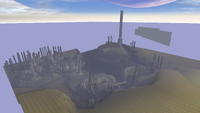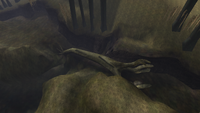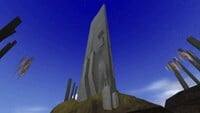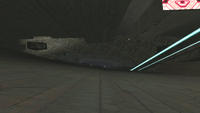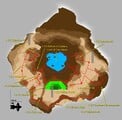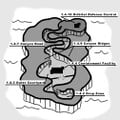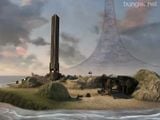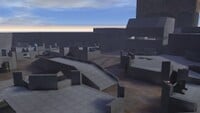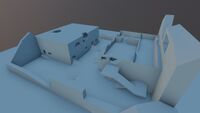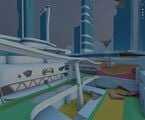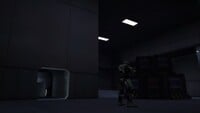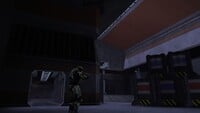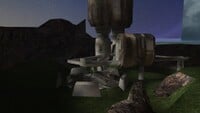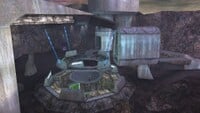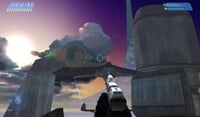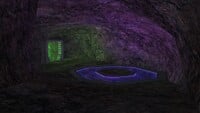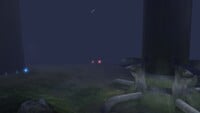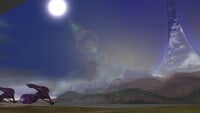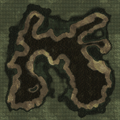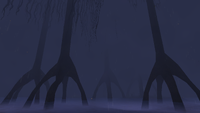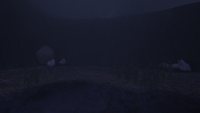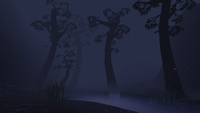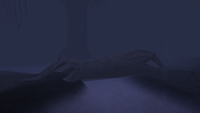Cut Halo: Combat Evolved levels
From Halopedia, the Halo wiki
| This page discusses elements of deleted material and cut content. Some information on the page is sourced from game files and may not be verifiable through external sources. Where possible, such information should be clearly-marked and replaced with a proper external source as soon as one is available. |
This article is part of a series on
Halo: Combat Evolved cut content
- Cut content
Pre-Xbox Halo
Cut characters
Cut dialogue
Cut enemies and ambient life
Cut levels
Cut medals
Cut vehicles
Cut weapons
- Development
To check out cut content for other Halo games, see here!
- "[Crunch] happened on Halo 1 as well, of the 25 planned missions for Halo, we shipped 10. Part of the problem is that as team size grows, all the really informal, seat-of-your-pants stuff you've been doing just doesn't work."
- — Chris Butcher on Halo's cut levels.[1]
During the development of Halo: Combat Evolved, the game took many forms including real-time strategy, third-person shooter and eventually, first-person shooter. As the game transitioned into an FPS and a release for the Xbox platform, work on the game's campaign still hadn't begun by September 2000.[2] Mission brainstorming later began in earnest in December[3] with the rest completed over the course of 2001. This page documents the levels known to be cut from release, predominantly those planned out for the game's final FPS release.
Overview[edit]
- "I vividly remember building, literally on 3x5 index cards, a number and letter system. A10, A20, A30 and so on for each one of the missions. B30 was “The Silent Cartographer”. I pinned them to a board and I just stared at it for hours. There must’ve been 40 of those cards of there, and I’m like: “There’s no way in hell we’re going to build all of this.”"
- — Marcus Lehto on Halo's cut levels.[4]
When planning out Halo: Combat Evolved's campaign, Marcus Lehto originally planned things out on 3x5 index cards, with a number and letter system assigned.[4] These names can be found in the final game map files, and are listed as such below;
A10- The Pillar of AutumnA30- HaloA50- The Truth and ReconciliationB30- The Silent CartographerB40- Assault on the Control RoomC10- 343 Guilty SparkC20- The LibraryC40- Two BetrayalsD20- KeyesD40- The Maw
As can be seen in the numbering, there are several missing gaps indicating where levels were to be included, before being cut. At some point in development, the 40 missions Lehto planned out were eventually reduced to a more manageable 25, though another 15 were later cut for final release.[1]
Campaign levels[edit]
Very little actual game data is known to remain of the cut Halo: Combat Evolved campaign levels. The vast majority of information comes from Bungie design documentation, relayed via the notes of Kenneth Peters for research with the Digsite project at 343 Industries.
A20[edit]
A20 was a level that existed in a "Key Plot Points" document from Joseph Staten dated January 24th, 2001. It was combined with the level Halo (A30) by final release, and is noted to seem to have been the crash-landing area and “natural formation” tunnel entrance.[5]
A40[edit]
A40 was a level that existed in a "Key Plot Points" document from Joseph Staten dated January 24th, 2001. The level objective was to attack a Covenant excavation site, and would have been the introduction for the original implementation of Engineers before they were cut from the game. The level would have featured a light bridge and Forerunner tunnels, but the specifics are unknown.[5]
B10[edit]
B10 was a level that existed in a "Key Plot Points" document from Joseph Staten dated January 24th, 2001. In this version of the level, the player was to have been tasked with assassinating a Covenant "Prophet," and would have recovered "keys to the Control Center," likely to have been keys to unlock the doors of the Control Center itself.[5] At this stage in Halo, the San'Shyuum species (more commonly known as "Prophets") did not exist yet and were to debut in Halo 2 - instead, the Prophet target of the level was to have been an Elite wearing a "funny hat"[6] - something which likely went on to inspire the Elite Councilors in Halo 2 instead. Similarly, the objective of assassinating a Prophet was realized in Halo 2 with the Prophet of Regret, in the levels Delta Halo and Regret.
B20[edit]
B20 was the original planned swamp-themed Campaign level. It would have featured a mysterious monster that lurked in the central portion of the map, forcing the player to take a wide path around that middle section to avoid being killed while they made their way to a tower in the distance.[7] After cutting, the exterior level geometry would be incorporated into the level 343 Guilty Spark (C10).[5] Per notes of a "Key Plot Points" document from Joseph Staten dated January 24th, 2001, B20 was going to a level centered around the Covenant accelerating it's military occupation forces against the human resistance after the death of the Prophet.[5]
The tags for a version of B20 were made available for use in the Halo: Combat Evolved Mod Tools on June 20th, 2024. They are labeled as deriving from Xbox-compatible tags, of an unknown build.[8] This release of B20 exists in an as-is state, having a clear afternoon sky and with assets like trees being amiss. As well, the level is empty, with no scripting and only a single unimplemented grunt encounter. The similarities with the level 343 Guilty Spark are abundant, with the player naturally following a path to the right, and even crossing over a fallen tree bridge. The most notable difference is instead of the entrance to the containment facility, the level features the aforementioned large tower at the end of the path, which presumably would appear endless in a foggy atmosphere. The tower has an interior, however in this iteration is it not accessible by the player from any conventional means.
In what seems to have been an earlier version, B20 was the original Prophet assassination level. Little is known of this version, though some files were said to still exist at 343 Industries. However most information was said to come in the form of missing tag references, as opposed to actual useable files.[7] As part of the Digsite project, B20 was explored for potential use as a Firefight map.[9]
The Silent Cartographer "X40"[edit]
- Main article: The Silent Cartographer, X40
The original intro cinematic for the level B30, known in final game as The Silent Cartographer, included a "rallying speech" by Captain Keyes per notes of a "Key Plot Points" document from Joseph Staten dated January 24th, 2001.[5] This aligns with a scene that can be found within the original storyboards for Halo labeled as "X40."[Note 1] The storyboards depict a location missing from the final game, the makeshift human base on an island at a "large Forerunner structure." The environment has a major resemblance to what is seen in the level Halo. The base was situated near pacific coastal waters, inside a mountainous locale strewn about with waterfalls, with the Forerunner structure itself being distinctly based on the beam emitter towers seen in the respective level.
Below is a selection of the X40 storyboards:
Assault on the Control Room "Volcano"[edit]
Per notes of a "Key Plot Points" document from Joseph Staten dated January 24th, 2001, the level B40 known in the final game as Assault on the Control Room was originally going to be centered around a Volcano, with the Covenant attempting to break in by using a vehicle referred to as "the 'Mech", a progenitor of the Scarab. This was presumably due to the player having already taken the keys in B10.[5]
This information lines up with a development update from Matt Soell in December 2000, discussing a level involving "a volcano and something I can only refer to as heavy machinery."[3]
343 Guilty Spark "Glassed"[edit]
In the original Halo storyboards, the level 343 Guilty Spark, known internally as C10, had a different environment than what is seen in the final game, and was referred to as "Nuked Forerunner Installation." This aligns with notes of a "Key Plot Points" document from Joseph Staten dated January 24th, 2001, where "the swamp was glassed before arrival." Prior to its cutting, the level B20 would have featured the swamp geometry seen in the final game.[5] The Jenkins-cam Flood reveal scene in the storyboards, labeled as "X50,"[Note 1] shows this in various ways. The marines' Pelican is seen first flying over an ocean, before eventually reaching a shoreline that leads into "burned remains of a forest," and landing in a "desolate crater."
Below are the relevant X50 storyboards:
C30[edit]
C30 was a level that existed in a "Key Plot Points" document from Joseph Staten dated January 24th, 2001. The level was centered around activating the Ring's "orbital defenses" and having the player "call down particle beam strikes."[5]
An overview map of C30 contains the following level beats, presented here in numerical order:
- 1.4.2 Drop Zone
- 1.4.3 Outer Courtyard
- 1.4.4 Containment Facility
- 1.4.7 Canyon Road
- 1.4.9 Canyon Ridges
- 1.4.10 Oribital Defense Control
A notable point is the "Containment Facility," however the relation between this and the facility found in the level 343 Guilty Spark (C10) is otherwise unspecified.[5]
D10[edit]
D10 was a level that existed in a "Key Plot Points" document from Joseph Staten dated January 24th, 2001. The main beat of the level was escaping from sentinels after the level Two Betrayals, and featured a "stunt-filled action extravaganza ending". The Warthog run seen in The Maw was partly repurposed from this level.[5]
D30[edit]
D30 was a level that existed in a "Key Plot Points" document from Joseph Staten dated January 24th, 2001. The level featured Cortana calling all surviving Marines to retake UNSC Pillar of Autumn, and has been described as "everyone against everyone." 343 Industries would eventually later adapt this for Last Stand, the final mission of Halo: Fireteam Raven.[5]
Multiplayer maps[edit]
Bungie[edit]
The following are cut multiplayer levels from Bungie during development of the original game, spanning the Pre-Xbox and Xbox eras.
First multiplayer test map[edit]
It has been noted that the Halo 2 DLC map Relic was based on the first multiplayer test map from the Pre-Xbox era of Halo, which was also the reason behind its name:[10][11]
- "The actual origins of Relic go back much farther than you might think. While this map ultimately took shape in the weeks and months following the release of Halo 2, it started from a concept created long, long ago. " Visually, the artist, Chris Barrett, went back to the very first multiplayer map ever made for Halo. This was a test map made in the days before Bungie was bought by Microsoft, when Halo was a PC project," explains Stokes. So in essence, this map is quite literally a relic from the ancient days of Halo."[12]
The original map in question was not specified further. It is likely that the actual layout of Relic would not resemble the level, as it was chosen for aesthetic purposes, not design reasons, with Relic being said to have gone through significant changes in development.[12] A notable prospect is the 1999 version of Spasm, with the two sharing various aesthetic qualities; however Spasm was a general development testbed, not designed as a multiplayer map. The internal name for Relic was dune, which could possibly be related to the original.
Mofocross[edit]
"Mofocross" was a map created by Max Hoberman created back at the old Bungie offices in Chicago in c.1999. It consisted of an island with a racetrack running throughout it that would allow players to race Warthogs and Ghosts around the island.[13]
Ruined Pain[edit]
A map codenamed ruinedpain is referenced inside Combat Evolved's files. Two different versions are known to exist in different stages of development.[7]
UNSC version[edit]
| “ | All pain, some gain. 8-16 players.[7] | ” |
This version of Ruined Pain is believed to date back to a very early stage of Halo FPS-era development. During initial Digsite playtesting, the original map was found to be scaled for a smaller player character, matching older iterations where they were roughly the same height of a marine in the final game. As part of the effort to restore this map for play in MCC, the map was scaled up by x1.5. Digsite member killzone64 then finished up the map for multiplayer by adding weapons, player spawns, and some barrels to allow players to jump up onto the bases easier; as well as crafting a "chaotic" course for use in the Race gametype. The tags for the Digsite-restored iteration of this version of Ruined Pain was made available for use in the Halo: Combat Evolved Mod Tools on July 7th, 2023.[7] They are labeled as deriving from Xbox-compatible tags, of an unknown build.[8]
This version of the map aligns with information that was recalled by Hardy LeBel in 2015. Although he was not certain the map was Ruined Pain, he thought the name sounded familiar, and said the only map that he could remember cutting from the game involved a huge human interior space and created by Paul Russel as a test for his human architectural styles. When Lebel was given the files for the space, he considered it too unwieldy as a workable multiplayer map, and with Russel busy with working on campaign levels, it was ultimately scrapped.[14]
Reach version[edit]
Another version of Ruined Pain can be spotted in the 1749 Beta, where the image for the level Damnation features the map in an untextured blockout form, with the description "Colony remains on Reach". As part of the Digside initiative to uncover and restore cut content, this map is being further developed by Conscars under the name "Purgatory", combining the existing model with a modified layout and new scenery inspired by the Beta 1749 description.[15]
As of July 7th, 2023, the Digsite team is still working on restoring and releasing this version of Ruined Pain and Purgatory.[7]
The level as it appears in the 1749 Beta.
- Purgatory
Gearbox[edit]
The following are cut multiplayer maps from Gearbox Software, as potential inclusions for new maps in the Halo PC port.
Indoor[edit]
| “ | Imagine the smell. 4-8 players.[7] | ” |
Indoor is a map developed by Gearbox Software for the Halo PC port, though never shipped with the game.[9] The map was the most complete of the Gearbox cut Combat Evolved maps, with already near-finished visuals and a close-quarters, small-team layout - unlike the other Halo PC maps which were all designed for Big Team Battle.[7]
In the Digsite restoration project, Indoor was taken by contributor Ludus and taken to a state of completion in a new map called Underground. Underground was created by Ludus with a goal to fix up Indoor's messy spawns and layout using feedback written by Bungie for Gearbox back in Halo PC's development alongside a suite of textures created by Gearbox but never used in-game. The textures (and map theme in general) are human in nature - with Combat Evolved having few human-themed environments, this provided an opportunity to increase some visual variety in the Combat Evolved multiplayer experience. The map's soundscape was updated to include blaring sirens inspired by those of the film Alien.[7]
The tags for both the original Indoor and the Digsite-revamped Underground were made available for the Halo: Combat Evolved Mod Tools on July 7th, 2023.[7]
- Indoor
- Underground
Dusk[edit]
| “ | Watch your step. 2-4 players.[7] | ” |
Dusk was a map created by Gearbox Software for the Halo PC port.[9] Unlike Indoor, Dusk was not close to content-complete, and had a considerably less refined layout, with an inconsistent scale and a muddied centre layout resembling the map Rust from the Call of Duty franchise. As such, Digsite contributor Ludus used that as inspiration for his recreation of Dusk for the game's multiplayer, now-termed Abyss.[7]
Abyss reuses an unused texture originally developed for Indoor, and the skybox from the E3 2000 build of Combat Evolved. The tags for both Dusk and Abyss were made available for the Halo: Combat Evolved Mod Tools on July 7th, 2023.[7]
- Dusk
- Abyss
Swampthing[edit]
 This section needs expansion. You can help Halopedia by expanding it.
This section needs expansion. You can help Halopedia by expanding it.
| “ | Something in the mist...[7] | ” |
swampthing was developed by Gearbox Software for Halo PC as a map with a similar theming to the level 343 Guilty Spark. The tags for Swampthing were made available for use in the Halo: Combat Evolved Mod Tools on July 7th, 2023.[7]
Post-launch maps[edit]
A number of maps were created by the developers at Gearbox Software during their production of Halo Custom Edition and the Halo Editing Kit, that were not included in the official release of these levels. Gearbox developer Marc Tardif noted the following in an interview with Gamespy:
- "The Halo team at Gearbox has created a few new maps since the game has released, but we're not releasing them at the same time that we release this new software. Our new maps do need a bit more attention before they can be released, and we also want to see how the community responds to all the great, new things that HaloCE and the HEK allow. We know that with the HEK, there will be huge amounts of new content coming from end users and we have an interest in seeing the best of this material join our own maps as official maps. In the future, I expect we'll have more official maps, and I think that not all of these maps will have been created solely by the folks at Gearbox."[16]
Miscellaneous[edit]
The following levels are ones that were not conventionally designed for campaign or multiplayer, but were general test maps or served some other purpose.
Spasm[edit]
 This section needs expansion. You can help Halopedia by expanding it.
This section needs expansion. You can help Halopedia by expanding it.
| “ | Ancient, Epic, Mysterious[7] | ” |
spasm was a map prominently shown throughout much of the development of Halo: Combat Evolved while it was still intended to be a third person game releasing on personal computers. Notably the Macworld 1999 and E3 2000 demos feature different iterations of Spasm. The tags for the Digsite-restored Macworld 1999 iteration of Spasm was made available for use in the Halo: Combat Evolved Mod Tools on July 7th, 2023.[7] They are labeled as deriving from a source folder named "Halo," dated June 23, 1999.[8]
Swamp[edit]
| “ | It’s a wet heat, though.[5] | ” |
swamp, once referred to as Swamplands by 343 Industries, was a swamp-themed map present in 2000 and MacWorld builds of Halo. This swamp environment would form the basis for the cut campaign level B20, the retail campaign level 343 Guilty Spark, and the cut Halo PC map Swampthing—as well as the Halo 2 DLC map Backwash.[5] It is essentially a sibling level to Spasm, being from the same 1999 third-person PC era, and designed primarily as a test level.
The tags for the Digsite-restored version of Swamp was made available for use in the Halo: Combat Evolved Mod Tools on June 20th, 2024.[5] They are labeled as deriving from a source folder named "Halo," dated June 23, 1999.[8] The level consists of a large irregularly shaped pond, situated within hills taking up the edge of the map. The map's environment is largely recognizable for consisting of one tree type found throughout the level, though there are exceptions. The only distinctive landmark that can be found is a small fallen tree bridge, a feature that would later go on to appear in successor swamp themed campaign levels, however this version is uniquely hollow.
Notes[edit]
Sources[edit]
- ^ a b Eurogamer, Better Than Halo: The Making of Halo 2: Page 4 (Retrieved on Feb 27, 2022) [archive]
- ^ halo.bungie.org, Re: That reminds me...: "Have they moved into the single player portion of the game yet?
Nope. Although a lot of it is being discussed." - Matt Soell (Retrieved on Feb 27, 2022) [archive] - ^ a b Rampancy.net, 1/12/2000 Bungie Weekly Update (Retrieved on Feb 27, 2022) [archive]
- ^ a b VICE, The Complete, Untold History of Halo (Retrieved on Feb 27, 2022) [archive]
- ^ a b c d e f g h i j k l m n o Halo Waypoint, Digsite Deep-Dive (Retrieved on Jun 20, 2024) [archive]
- ^ Halo 3 Legendary Edition, Halo 2 developer commentary
- ^ a b c d e f g h i j k l m n o p q Halo Waypoint, Digsite Deliveries (Retrieved on Jul 7, 2023) [archive]
- ^ a b c d Github, digsite/h1
- ^ a b c Halo Waypoint, Cutting Room Floor (Retrieved on Jul 7, 2022) [archive]
- ^ Halo 2 Multiplayer Map Pack - Halo 2: Killtacular, timestamp 8:02: "The original idea came from the very first Halo multiplayer map back on the PC" - Chris Barrett
- ^ Halo 2 Multiplayer Map Pack manual - Relic, page 6: "Artist Chris Barrett wanted the map to feel familiar. "I wanted to capture some of the feel of the original Halo," he says. "In this case, one of the first test levels we built was the inspiration." "
- ^ a b Bungie.net, Relic Revealed (Retrieved on Feb 4, 2021) [archive]
- ^ Twitter, Max Hoberman (@MaxHoberman): "Seeing these old Halo multiplayer maps being resurrected makes me want someone to dredge up Mofocross. It was a Warthog v Ghost race map, with a road that looped around the perimeter of an island. I made it using the terrain editor, way back in Chicago ... I think in 1999." (Retrieved on Jul 31, 2023) [archive]
- ^ YouTube - Hardy LeBel, Question Session - Level Design: (Local archive) "Hmm, well I don't know anything about a volcano mission for single player. And I'm not certain about this, but Ruined Pain sounds familiar. I can say that I had one other map in CE that I cut before we shipped. It was an absolutely HUGE interior "Human" space built by Paul Russell. I think he made it as a proof of concept for his Human geometry. He gave me the files for the space, but as I was looking it over it was so huge that it really would have needed lots of time and energy to make into a good MP map - time he simply didn't have since he was so busy with single-player stuff. So alas - the world never saw it. That might have been Ruined Pain. But we may never know..." - Hardy LeBel
- ^ Halo Waypoint, Cutting Room Corps (Retrieved on Mar 7, 2024) [archive]
- ^ GameSpy, Gearbox Software Announces Halo CE (Retrieved on Nov 11, 2023) [archive]
